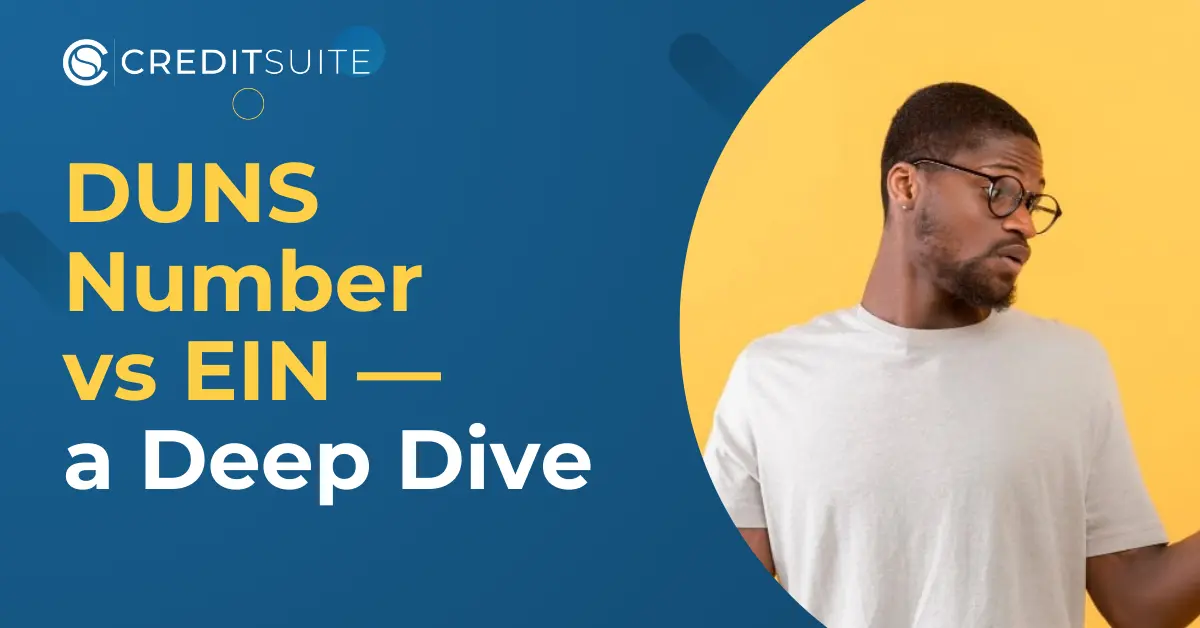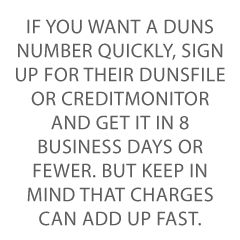This blog may contain affiliate links that might result in Credit Suite receiving a commission if you use them. This has no impact on the price you are charged for the product or service.
Your DUNS Number vs EIN – How Do They Work?
Business credit is governed by numbers. The two most common are the D-U-N-S and the EIN number. When you investigate DUNS number vs EIN (or Employer Identification Number), you may be wondering how they’re both used.
Does a small business really need both? What if you only have one?
Yes, you need both! While technically you could have either one or the other, they are far better together. Their origins and purposes are rather different.
How the DUNS Number Works
A DUNS number comes exclusively from Dun & Bradstreet. While there are companies online which purport to be able to get you a DUNS number, you don’t need them.
You can just go to the D&B website and go through fewer than half a dozen screens. Your DUNS number will arrive in about a month.
If you want a DUNS number quickly, sign up for their DunsFile or CreditMonitor and get it in 8 business days or fewer. But keep in mind that charges can add up fast.
One use of the DUNS number is for D&B to reliably identify businesses in their database. Numbers means keeping millions of businesses straight does not rely on perfect spelling.
Another DUNS number use is vetting potential partners. Like Dun & Bradstreet uses these numbers for identification purposes, so do entrepreneurs.
Companies might need a DUNS number to bid for federal government contracting. But the Federal government uses their own numbers now, for every sponsored project (government contracts).
Soon, the federal government will only use SAM registration (System for Award Management) numbers. SAM works like a tax ID for federal grant applications (includes grants from Health and Human Services) and sponsored programs.
SAM will also be used for cost allocation certificates.
Apple requires a DUNS Number to create Company iOS developer accounts. A DUNS Number can help verify company credentials and existence, during an SSL application.
Universities may need a DUNs as part of the institutional information they have to provide to get insurance coverage.
How a DUNS Number Helps with Building Business Credit
A DUNS number is a direct link to a company’s business credit reporting with Dun & Bradstreet. When a company gets a DUNS number, it can work to establish its own business credit file.
It can then start to build its business credit score. Unlike with personal credit, a company must have to have payment experiences reporting. But with a DUNS, they can build a solid business credit file.
With no business credit profile, a business cannot help itself.
To start to get a PAYDEX score, a business must have a DUNS number and three or more tradelines reporting (often from using business credit cards). Combining both generates a PAYDEX score. If a business has diligently paid its best credit card bills, then that PAYDEX score should be good.
Experian and Equifax, on the other hand, will generate a failing score if they have a record for a business and no business credit usage recorded yet.
Once Dun & Bradstreet has a PAYDEX score for a business, Experian and Equifax will likely start updating their records.
If a small business buys from a credit issuer which reports to another business credit bureau (say, Experian), then the company’s business credit score will rise there, too.
Since many lenders and credit issuers will check a business on Dun & Bradstreet, it is vital to have a DUNS number. E.g. Creative Analytics requires a business seeking corporate credit cards from them to have a DUNS number—and this vendor doesn’t even report to D&B!
How an EIN Number Works
An EIN number comes from the Internal Revenue Service and goes on your business taxes. It works much like a Social Security number works as an individual taxpayer identification number. It helps you keep business expenses from affecting personal credit scores.
But just having one does not by itself protect personal credit.
Unlike with a DUNS number, there is no paid option for expediting getting an EIN. But if a business owner chooses to receive a letter online from the IRS, they’ll get an EIN in a few minutes.
If you elect to get your EIN via snail mail, then the process can take up to four weeks. The pandemic and the Great Resignation will likely affect this estimate.Even a sole proprietor might receive a paper letter later rather than sooner.
Your EIN serves as your business’s identification number for tax purposes. In addition, during the process of getting your EIN, you will tell the IRS which type of legal entity you have. You will also tell them enough about your business and its industry to get an NAICS code.
The IRS allows for five purposes for getting an EIN:
- You are starting a new business
- You’re hiring employees
- The number is necessary for banking purposes
- You changed your business entity, such as from sole proprietorship to an S corporation
- Or you’ve bought an active business
The IRS requires that the name you list matches the articles of incorporation perfectly. You will need to list any DBAs, if applicable.
How an EIN Helps with Building Business Credit
Just like they want you to have a DUNS number, a business credit card issuer wants you to have an EIN number. They will verify it on your business credit report when you apply for credit.
Vendors want your business address with Dun & Bradstreet to match Secretary of State (SOS) and IRS records. An EIN number is how a starter vendor verifies that.
One necessary use of an EIN number is opening a business bank account. Virtually all the starter vendors that Credit Suite works with will require for your company to have a business bank account.
A business bank account is also useful for everything from avoiding the commingling of personal and business funds, to paying your employees. When your business is paid for goods or services, a business bank account is where that payment should properly go.
Another use for an EIN directly related to business credit building is business owners need one to get local permits and licenses. Starter vendors will also check if a business has all necessary licenses.
Also, while Secretaries of State don’t seem to require a business to have an EIN number, they do require proper licensing. Starter vendors also require that a business be in good standing with the Secretary of State.
No EIN? Then a business can’t open a business bank account. They can’t get proper licensing. They cannot be in good standing with the Secretary of State. Starter vendors will reject their business credit applications.
The IRS will want a word with them, too.
Takeaways
Yes, you need both! Fortunately, they’re easy to get. If you can wait a bit for your DUNS number, then you’ll pay nothing for both.


